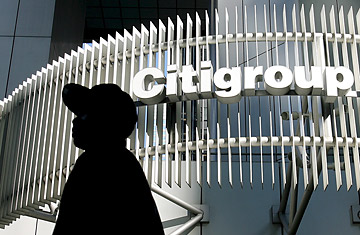
A pedestrian passes the Citigroup headquarters in New York City.
Citigroup hasn't lost all its muscle. Despite talk of nationalization and speculation that bad loans might soon push the bank into insolvency, Citi's bankers who advise other companies on mergers and acquisitions are having a banner year. Through the first two months of 2009, bankers at Citi were hired to offer guidance on more of the nation's largest deals than any of its rivals, according to Dealogic, which tracks financial activity. Globally, Citi has been a part of four of the six largest deals in 2009. Its biggest score came in January when it was picked by Pfizer to be one of the drugmaker's advisors on its $68 billion acquisition of rival Wyeth. "We are very proud of the success we have had this year," gushes Mark Shafir, who is the head of the M&A division at Citi.
The success of Citi's dealmakers comes as a surprise because the sprawling bank has generated nothing but frightening headlines in recent months. Like the other big banks, Citi received billions in aid from the government, and has been back to the government's well more often than most. Last month, the Treasury, along with private investors, agreed to convert some of their Citigroup preferred shares into common stock, which will strengthen the company's capital position. All told, the government has injected $45 billion into Citi by buying preferred shares; it has also insured the bank against losses on as much as $300 billion in loans and bonds. It is assistance the bank has needed. Citi lost $19 billion in 2008, and analysts expect the red ink to continue for some time. (Read "Citigroup Plans Big Bonuses Despite Rules Against Them.")
Hidden by the big bottom-line losses are a number of Citi businesses that seem to be doing well. Along with mergers and acquisitions, analysts point to Citi's foreign-currency trading divisions and its business of processing payments and moving money around the world as two other bright spots. Earlier this month, Citi CEO Vikram Pandit said his bank was profitable in the first two months of the year. "M&A alone is not a big enough businesses to swing the bank," says analyst Richard Bove, who follows bank stocks at Rochdale Securities. "But put them all together, along with the fact that Citi's business is positioned to benefit from the recent drop in interest rates, and it makes a difference."
Advising companies on mergers has long been one of the big moneymakers on Wall Street. Companies doing an acquisition or being bought typically hire an investment bank, or a few, to steer them through the transaction. The companies pay fees for this work, which advisers for both the buyer and seller usually split. For large transactions these fees can be substantial: Pfizer is paying an estimated $207 million in M&A fees to the seven banks that are acting as advisors to both companies.
For decades pure investment banks like Goldman Sachs and Morgan Stanley dominated M&A. But in the past few years, the ability of the large banks to offer billions of dollars in loans to finance transactions has raised their standing among dealmakers. Citigroup has been the most successful in wresting away this profitable business.
Boutique firms believe that Citi's troubles will shift the balance in the M&A business again. "We are being approached by more and more clients who are concerned about getting services from entities that are having trouble," says Kenneth Berliner, who is the president of top boutique investment bank Peter J. Solomon. "How much longer are the bankers who work there going to stick around?"
For the time being, Citi's M&A team appears unaffected. Shafir says none of the hundred bankers who work in his division have left the firm on their own. And the firm is expected to rank among the top global M&A advisers when the so-called League Tables that rank investment banks come out for the first quarter of 2009 in the next week or so.
Shafir says despite the swirl of bad news surrounding Citi and Wall Street in general, he and his bankers have stayed focused. He also notes that last Thursday when the House resolution was passed to impose a special bonus tax on employees of many troubled financial institutions, including Citi, nothing out of the ordinary happened in Citi's offices. He says he hasn't had to spend a lot of time defending the firm, nor has he noticed any government intervention in running his part of the business. "In the last several months I have gotten calls from friends asking how I am doing," says Shafir. "But I would guess that is no different from any investment banker at any firm."
Shafir joined Citi last October from Lehman Brothers, shortly after that firm went bankrupt. Shafir says he in no way regrets the move, and has no plans to leave Citi anytime soon. "I'm here because I want to be," says Shafir. "I am very proud of this place."
